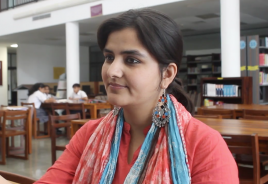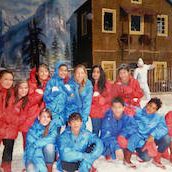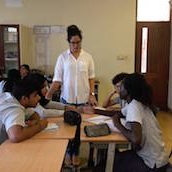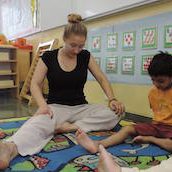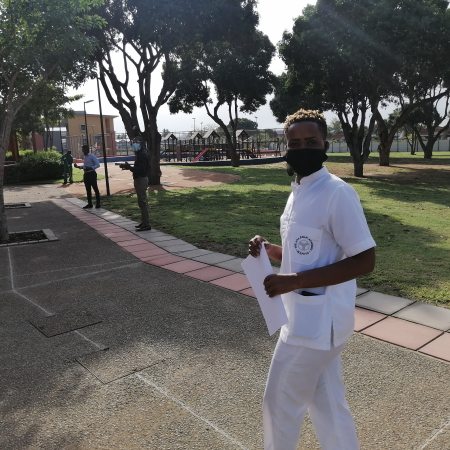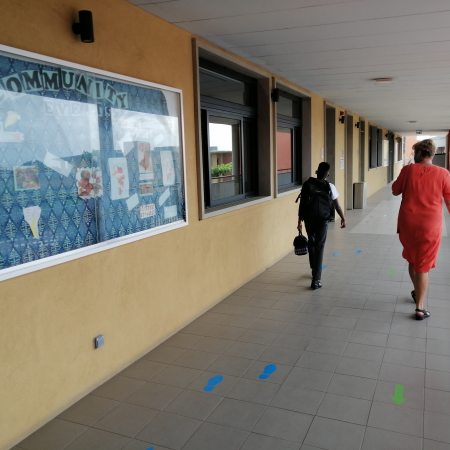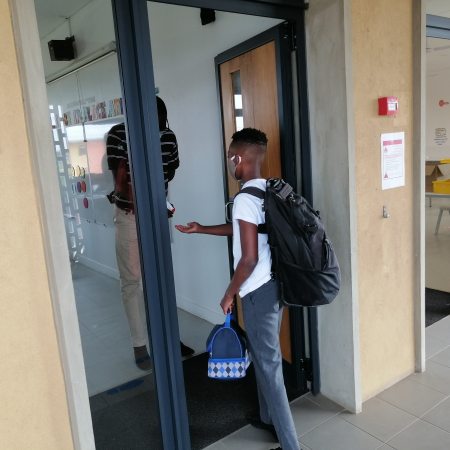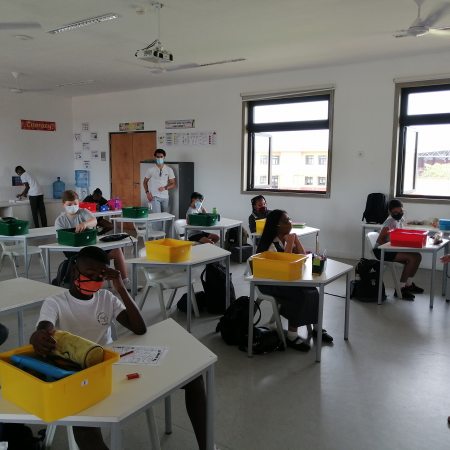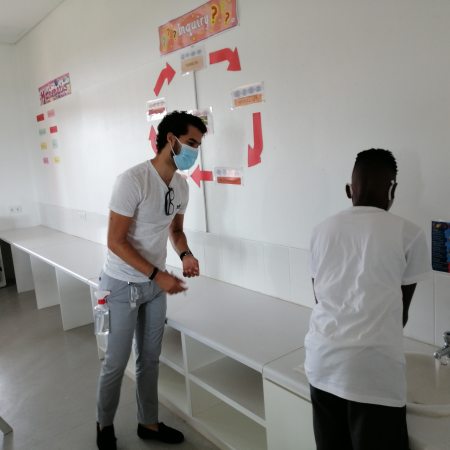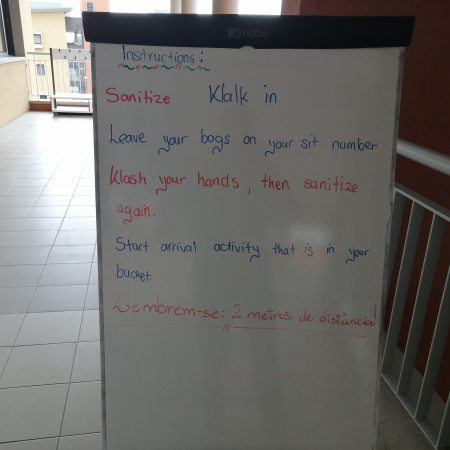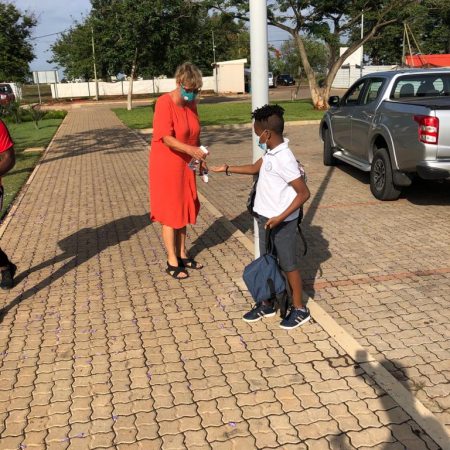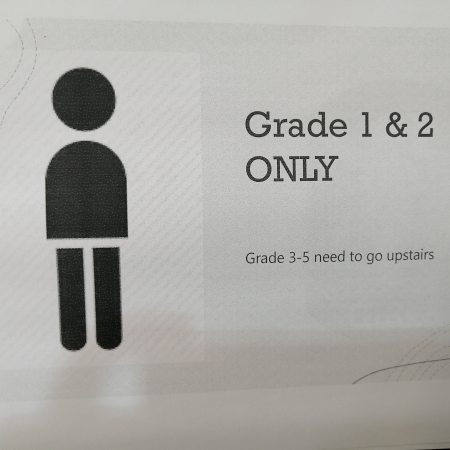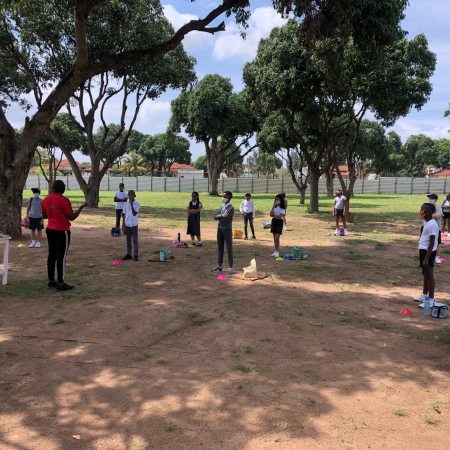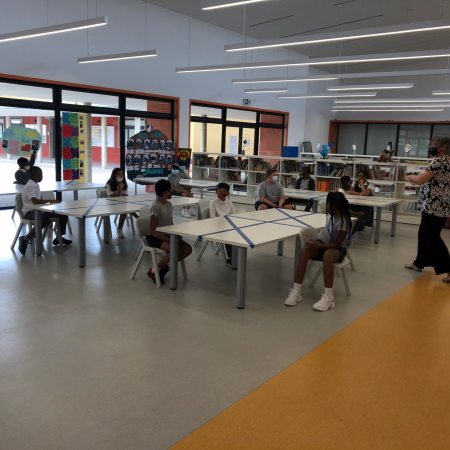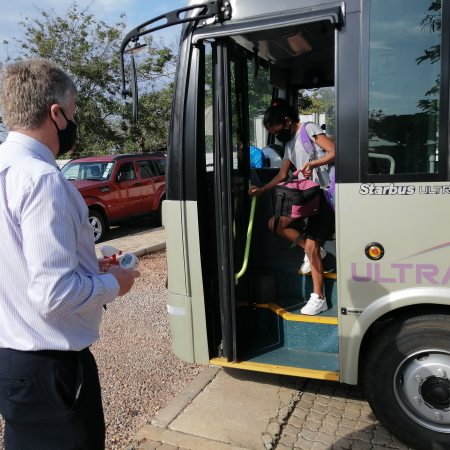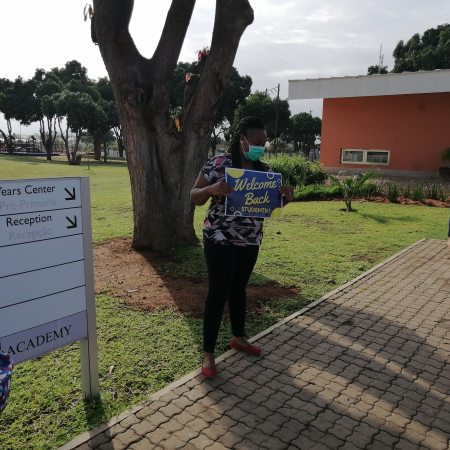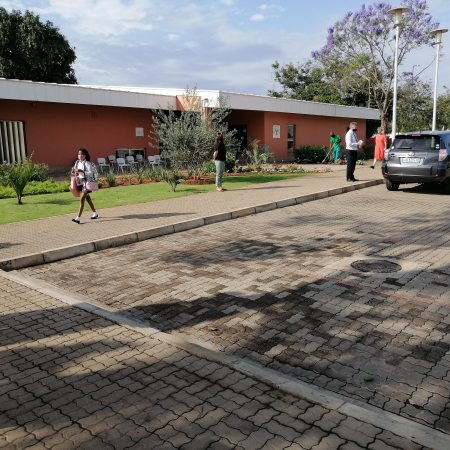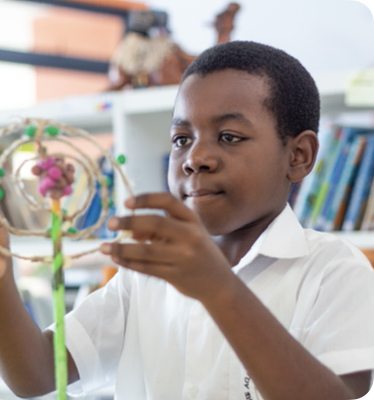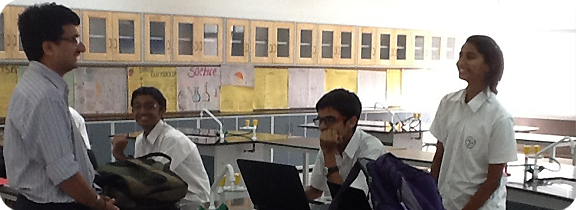
Faculty Development
Promoting excellence in teaching, both on campus and more broadly, is a fundamental goal of the Aga Khan Academies.
The effort to establish a Professional Development Centre (PDC) at each Academy is one of the outstanding features of the network. The PDC aims to strengthen the profession of teaching in the region by providing substantial professional learning opportunities and modelling highly effective educational practice.
Developing strength in teaching
The Academies aim to identify and develop teachers of the highest quality who are committed to both the all-round development of young people and to their own professional excellence. The Academy PDCs support excellence by striving to model best practices in teaching and learning within all of its classes and by providing high quality development opportunities for all Academy teachers.
Faculty members are also enriched by opportunities to work collaboratively with more experienced colleagues from around the globe and to teach abroad within the Aga Khan Academies network.
Investing in teachers
In addition to a broad programme of professional development for faculty and staff, the Academy PDCs offer substantial programmes under their Professional Learning for Educators Series (PLES) for teachers in local government, independent and not-for profit schools.
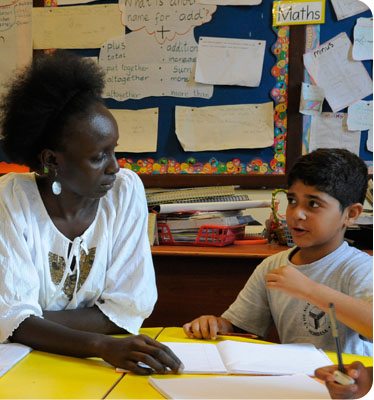
The PLES programmes are specifically designed by the Aga Khan Academies to respond to the needs of teachers, as identified through extensive market research and dialogue with government officials and education departments.
The series includes programmes for teachers in various subject areas as well as specialised programmes focussing on the skills and capabilities required for effective teaching.
Each programme builds professional competence by focussing equally on enhancing teachers’ subject knowledge and on how best to teach that subject. Each provides participants with a balance of intensive facilitated learning activities followed by an extended period of assisted application and observation within the context of their own classrooms.
To read about participants' experience of these programmes, click here.
"In this ambition, we are heartened by an important new World Bank study which indicates that it is not the quantity of time or money that leads to educational success, but rather the quality of specific educational experiences. The stimulus provided by extraordinary teachers and exceptional companions is most important."
Renowned Mozambican actress, Lucrecia Paco visits the Aga Khan Academy Maputo
Maryam: Becoming a better teacher
The Teacher Preparation Programme (TPP) is one of the Aga Khan Academies’ landmark teacher development initiatives. In this interview with Kamini Menon at the Aga Khan Academy Hyderabad, TPP participant Maryam talks about the TPP’s unique aspects and her experience with the programme.
Please tell us a little bit about your background.
I’m a part of the Teacher Preparation Programme in Hyderabad. This is my fifth year in teaching, and previously I worked for a Teach for India school in Delhi teaching 48 amazing girls. When my fellowship with Teach for India was over, I applied to the Academy, and here I am.
What made you join the Academy and inspired you to come here?
My previous experience as a Teach for India Fellow made me feel like I wanted to something more than just being a teacher. So I was looking for an option post-fellowship that shared a similar mindset or similar values. When I read about the Academies, the vision really interested me as well as the whole inclusive policy: giving a chance to anyone coming from any background and making sure that we provide them this idea of excellence in education. That was something that really inspired me, and so I joined the Academy.
Talk about the Teacher Preparation Programme (TPP) and where you are in that journey.
The Teacher Preparation Programme is the initiative of the Academies to make sure that we have home-grown teachers who become IB educators. This is a great initiative. This is my ninth month into the programme, and I teach in a classroom, I research, and do a lot of things at the same time. I am getting mentored by experts and improving my pedagogy every day.
Can you explain the structure of TPP? How it is organised and what does it involve?
The programme is an intense 18-month long process, and you do things in phases. In Phase One, we were in a classroom, paired with a mentor, teaching 20% of the time. Now, we are in Phase Two, and I have to teach 50% of my time in a classroom. But it’s not just the teaching. We also have to write an action research paper, which is crucial to the whole programme. Another thing which is important is the Problem-Based Learning Sessions, which are a great way to reflect on who you are as a person, not just as a teacher. In these sessions, we meet three times in a week, and we bring together all our research findings and what we have collected, and we progress to the next learning target. We work on this in groups, and then we get to reflect and apply that in a classroom at the same time.
Can you share two aspects of the programme that you find particularly unique or helpful?
For me, the most interesting part was problem-based learning. It takes a lot of patience to think in a broader way about a problem. The problem sets are given to us – then you create your learning targets, and the whole group researches with different objectives. That makes you really responsible, that improves your research skills. At the same time, it teaches you how to collaborate with members of the group. Another part that I find really interesting and at the same time challenging is my action research piece. It’s not just research; the action part is the most challenging part because you have to reflect on your own practice. For example, I am doing something on inquiry right now, but it’s not just inquiry – it’s “why inquiry in an IB classroom?” or “why even think of those big theories?” So, this has made me more reflective, it has made me more thorough with my work. At the same time, if and when I fail, it’s alright to seek advice and it’s alright to go back to my mentor to ask why this did not work in a classroom. Both problem-based research and the action research, I find that these are pushing me to become a better teacher.
How would you evaluate the model of mentorship that’s in place within the TPP?
Sandra is our mentor, and she is a really experienced Ontario teacher. She has streamlined the programme, she gave it more structure and depth. When you work with Sandra, you are not intimidated by her. You are working with an expert who knows so much, but at the same time she gives you a chance to really apply yourself. She is a mentor for me when I am doing anything in the classroom – she is always providing me with constant feedback on my pedagogy and on my action research paper. Even in the intense Problem-Based Learning Sessions, where it gets a little crazy at times, Sandra is always there to nudge you in the right direction so you come to a conclusion.
How do you and your colleagues in the TPP work together and collaborate?
We are a very diverse group. Sitting with all of them has made me a better teacher in so many ways. It is not easy to admit sometimes that you don’t know things, but I get to learn from these people because their experience, our discussions, and the help we give each other is really great. We also collaborate outside the classroom – for example, if I have a doubt or find something challenging, I go to one of these colleagues and ask for their help. They are always there for me. We really push each other to reflect, to ask the right questions, which makes you think.
Can you talk more about the process of reflection that you have in your TPP group?
For us, reflection is about making yourself vulnerable in front of the whole group. It is not easy – it is not at all easy. We don’t reflect on a superficial level; we have to really apply ourselves in the entire process. When create our reflections, we have to share them with the whole group – and the group knows and understands who you are and gives you feedback. They push you to think along certain lines, and our mentors force us to think about the way we think – it becomes more about metacognition. The whole idea of learning from someone is that you have to be vulnerable and sometimes even fail, and then admit that you failed. When you draft that experience into a reflection, it makes you a better teacher. And definitely a better person.
How do you think the TPP has made you a better person in actual fact?
The way the TPP is designed, you become a reflective practitioner – that’s the goal! You teach in a classroom and you know that it’s not just a physical space, it’s much more than that. You cannot teach in isolation – you have to collaborate with other people, you have to go and ask for help. At the culmination, you really will become a better teacher. It’s a rigorous process, it’s an intense process, it’s a very reflective process. But the goal is that, ultimately, you will be the kind of teacher you want to be as well as an effective teacher.
Can you give us an example of how you’ve applied something you’ve learnt through the TPP in a classroom setting?
Right now, I am doing an action research, and a huge chunk of this is based on inquiry-based learning in a classroom. I’m teaching grade 6, and the unit I was dealing with was “did they live like us?” It is a lot about civilisations and the way people lived and interacted with their environment. All the research that I did during the Problem-Based Learning Sessions and my action research, I applied it in this classroom setting. I created the lesson plan and then got the feedback from my mentors. Then it gave me a chance to reflect on my practice: sometimes I tend to go a little overboard, and I got to see if my plan would work out. This is how you become a better teacher.
Is there anything else that you’d like to add about the TPP?
I’ll say, for the whole process, you have to be very open. You have to be open-minded to get into this process. It’s not easy just to acknowledge that you’re going though 18 months of training – you might feel intimated, or that your prior experience doesn’t matter. But that’s not the point. The point is to become a better teacher. If that is your goal, then this programme will work for you. The way this programme is designed is rigorous and beautiful. The most important point depends on you: what do you want to take away from this. And there is a lot, if you are really open to exploring.
Pinto Belo João: A determined teacher and a collaborative planner
“Being a teacher is not easy, because we have to teach and learn every day. I chose a career in teaching because I like to share what I know with others, especially young people, to help them to overcome the challenges in life. Being a teacher is like taking care of something special, so I decided to take care of that special thing, walking together in order to discover the world around us.”
Pinto Belo João is a grade 2 teacher at the Aga Khan Academy in Maputo. Born in Maputo, Mozambique, Pinto attended a teacher training course in Matola in 2007 where he became a primary teacher and then attended Pedagogical University in 2011 to study education. He came to the Academy as part of the Teacher Preparation Programme (TPP), which was established by the Aga Khan Academies to train recent teacher graduates to become International Baccalaureate (IB) teachers.
“Honestly I didn’t know many things about the Academy before I joined, but I always was eager to learn and grow professionally,” says Pinto. Through the Aga Khan Academy, Pinto says he has grown professionally in terms of learning new approaches to teaching and learning, trying new things and giving himself a chance to learn more. “Through professional development, the Academy helped me become a more effective teacher and a collaborative planner,” he says proudly.For Pinto, the most rewarding aspect of the Aga Khan Academy is teaching while surrounded by experts. This environment has given him the opportunity to try new things and granted him time to reflect on teaching strategies. This has been both valuable and powerful for Pinto as it allowed him to share experiences related to classes and receive guidance and support from others. What Pinto really likes about the Academy is the integration of the Aga Khan Curricular Strands. “In my opinion these Strands make us unique and different from others,” he says.
Reflecting on enlightening experiences at the Academy, Pinto narrates a particular day when he was teaching mathematics through games. He says that while he was giving instructions on how to play the game he was surprised to see the students already playing the game before he could even finish explaining. “I learned something that day: we should never underestimate our students. Sometimes we think that we have to teach something, but the students already know it. We need to be careful in our approaches,” Pinto remarks.
In this way, Pinto has learnt profoundly from his students and feels that the teacher-student relationship, reinforced by trust, is of the utmost importance. “We need to establish trust so that the process runs toward success both inside and outside the classroom,” he says.Relationships in the classroom must also involve parents – Pinto knows the importance and necessity of parental involvement in the education of their children. He regularly updates the parents about what they do in class and about their school trips – he also ensures that he shows parents the newsletter with stories of learning from the classroom. Some of the homework Pinto assigns includes parent personal experiences that they can share with their children.
At the Academy, Pinto says they try as much as they can to involve all students in activities and give each of them a role in groups to make them appreciate each other’s abilities. “By promoting activities like social community, [this] makes the students reflect on their own actions,” he remarks. Pinto explains that students come from different backgrounds and nationalities and that this is what makes the residential environment multicultural and promotes pluralism. When the students are exposed to this environment, Pinto says, “They learn more from each other and respect diversity. It is a great experience for them.” Ensuring a climate of pluralism on campus is not an easy task, Pinto says. “But through student’s responsibilities, we can ensure that they are working together.”
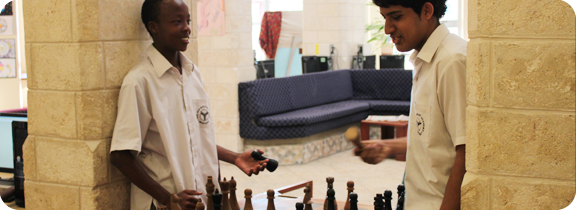
International Baccalaureate
The Aga Khan Academy, Dar-es-Salaam follows the principles of the International Baccalaureate (IB) and is preparing to become an authorised IB World School.
The International Baccalaureate (IB) is a non-profit educational foundation, motivated by its mission to create a better world through education.
The three IB programmes for students aged 3 to 19 help develop the intellectual, personal, emotional and social skills to live, learn and work in a rapidly globalising world.
Aims of the IB Programme
Founded in 1968, the International Baccalureate currently works with 3,423 schools in 141 countries to develop and offer their programmes to over one million students.
Their mission statement declares: "The International Baccalaureate aims to develop inquiring, knowledgeable and caring young people who help to create a better and more peaceful world through intercultural understanding and respect.
"To this end the organisation works with schools, governments and international organizations to develop challenging programmes of international education and rigorous assessment. These programmes encourage students across the world to become active, compassionate and lifelong learners who understand that other people, with their differences, can also be right."
The IB is more than its educational programmes and certificates. At heart they are motivated by a mission to create a better world through education.
They value their hard-earned reputation for quality, for high standards and for pedagogical leadership. They achieve their goals by working with partners and by actively involving stakeholders, particularly teachers.
The three programmes are:
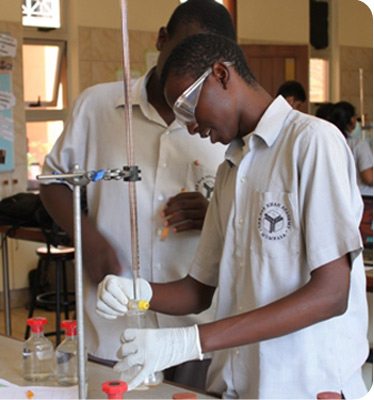 Primary Years Programme
Primary Years Programme
The Primary Years Programme (PYP) focuses on the development of the whole child, addressing social, physical, emotional and cultural needs, while giving students a strong foundation in all of the major areas of knowledge.
Through the PYP, children become aware of and sensitive to the points of view of people in other parts of the world.
Middle Years Programme
The Middle Years Programme (MYP) integrates the study of all the major disciplines, including languages, sciences, literature and the social sciences, mathematics, arts, technology and physical education.
The MYP normally includes a service component designed to encourage students to become involved with their communities.
Diploma Programme
The Diploma Programme (DP) is a two-year course of study that prepares students for university. All DP students study languages, a social science, an experimental science, mathematics and, usually, an arts subject.
At the same time as it provides a form of academic passport, the DP generally fulfils the requirements of a student's national education system. Each student's performance is evaluated by independent examiners and measured by his or her levels of knowledge and skills relative to set standards applied to all schools.
For further information please visit the website of the International Baccalaureate at http://www.ibo.org.
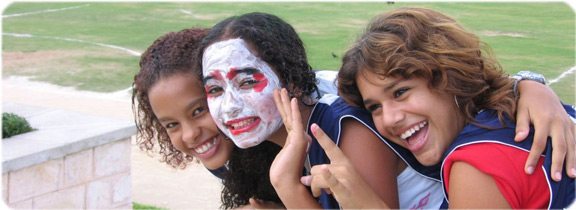
Academy Fellows - AA
With the aim of bringing diverse perspectives and fresh energy to the Aga Khan Academies, a small number of carefully selected recent graduates from well-respected universities are recruited each year to serve as Aga Khan Academy Fellows.
How can I become part of the Academy Fellow's Programme?
To find out more and submit your application, please visit the AKDN Career Centre
Applications are now open for opportunities in Kenya, India and Mozambique for 2020
What is the Fellows Programme at the Aga Khan Academies?
Academy Fellows have the opportunity to work with gifted and talented students from diverse ethnic, religious and socioeconomic backgrounds. Each Academy Fellow will live on campus and serve the student residential programme as a Dorm Parent promoting community life.
Academy Fellows have a demanding and important role in our community and may be responsible for any of the following, depending on the Fellow’s interests and experiences and the Academy’s needs:
- Key role as a Dorm Parent in the residential programme, which includes weekday duties and weekend duties.
- Assistance in a specific curricular area under the mentorship of an experienced master teacher.
- Tutoring individual students or study groups.
- Involvement in the administrative work of departments such as Admissions, Communications or University Counselling.
- Coaching sports and athletic teams, providing music lessons, SAT prep, artistic pursuits.
An integral part of the residential programme at the Academy, the Fellows participate actively in and chaperone off campus field trips, engage in the enrichment programmes (sports, arts, ...) and are closely involved in the student leadership development programme, including activities such as Model MUN, TedX etc.
These opportunities are offered at all our Academy campuses: Mombasa, Kenya, Hyderabad, India and Maputo, Mozambique - Future Academies are planned across Africa, South and Central Asia, and the Middle East.,In which parts of the world can I hope to serve as a Fellow?
Fellows can indicate a preference when applying.
Is this a permanent role or can I come just for a few months or a year?
These will be two-year appointments, overlapping so as to assure continuity. Some Academies will consider one year appointments but prefer a longer commitment.
What are we looking for in our Fellows?
- Genuine interest and commitment to the mission of the Aga Khan Academies and to the development of young people.
- A record of excellent academic achievement at a highly respected college or university.
- A record of significant involvement in residential life, student leadership programming, music, athletic and/or community service during college or university.
The Fellow's programme also provides onsite mentoring and coaching by experienced faculty and staff and an opportunity to experience life in a lively and dynamic school environment.
Some Fellows may come from the AK Academies’ alumni body and others may decide to pursue a career in teaching or education in general.
Do you want to hear more about the programme?
Click here to read what some of our former Fellow have to say about their experience.
To find out more and submit your application, please visit the AKDN Career Centre
Welcome back to in-person learning
The Aga Khan Academy Maputo welcomed back its students and staff on Monday, 2 November for in-person learning, while following numerous safety guidelines put in place in accordance with Mozambican law.

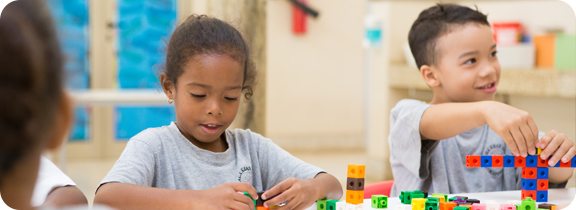
About the Academy
The Aga Khan Academy Maputo is the third in a network of Aga Khan Academies established by His Highness the Aga Khan. It follows the highly successful model established by the first two Academies, which opened in Mombasa, Kenya in 2003 and Hyderabad, India in 2011.
The Aga Khan Academy Maputo has been accredited as an International Baccalaureate (IB) World School for the Primary Years Programme, Middle Years Programme and Diploma Programme.
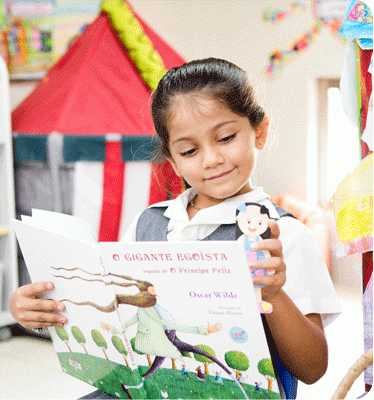 The Academy features state-of-the-art facilities, a multicultural student body, and an experienced team of educators and staff. We provide students with education of the highest standard in order to prepare them for lives characterised by leadership and service.
The Academy features state-of-the-art facilities, a multicultural student body, and an experienced team of educators and staff. We provide students with education of the highest standard in order to prepare them for lives characterised by leadership and service.
Admission to the Academy is means-blind and is based on merit. We consider all eligible students regardless of socio-economic status.
A culture of excellence
As with all the Aga Khan Academies, we are committed to excellence in all aspects of education. This commitment includes the academic curriculum as well as the campus where students live and learn.
Our campus is architect designed and is being purpose built. With state-of-the-art classrooms and resource areas, and extensive sports facilities, our campus will provide an inspiring environment for both students and staff.
At the Academy, we strive to create a balance between academic demands, sports, cultural activities and community life. We challenge our students to be intellectually inquisitive and socially conscious. We also encourage them to respect and appreciate other people’s cultures, social structures, values and beliefs.
A rigorous academic programme
The Aga Khan Academies' academic programme has been developed through the implementation of the widely-recognised International Baccalaureate. The programme is designed to challenge students of all backgrounds.
Our aims for our students include:
- promoting academic excellence
- enhancing analytical and study skills
- building leadership skills
- fostering an ethical outlook and sense of civic responsibility
- developing an understanding of global issues
- encouraging creativity.
Experienced local and international teachers lead our programmes. Faculty members are up-to-date with the best educational practices. They are committed both to their students’ learning and to their own continuing professional development.
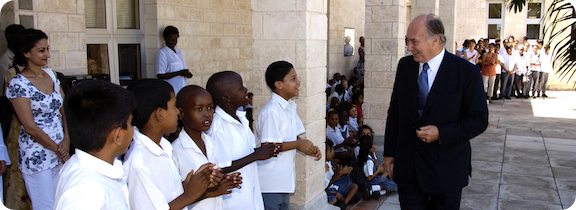
Vision
The outlook and educational perspectives of the Aga Khan Academies are based on the vision of His Highness the Aga Khan. His vision looks to education of the highest quality that can prepare young people to lead and enact positive change in the world they inhabit.
The text below outlines His Highness' vision for the Aga Khan Academies.
A time of change
"We live in a time of rapid change — change that is often unpredictable and not always positive. My experience with development, as an observer and a practitioner, has led me to the conclusion that the best way to manage change, whether positive or negative, is to prepare for it and that there is no greater form of preparation for change than investments in education. These investments must focus, of course, on teachers of the highest quality — teachers who are creative and committed to their own life-long learning and self-improvement. It also means investments in facilities that provide an environment conducive to the less tangible but equally important elements of an education — self-esteem, leadership, tolerance, ethical judgment and moral reasoning."
What does it mean to be educated?
“However, as educators and parents have begun to make these investments, they are revisiting the age-old question: What does it mean to be an educated person? Many have come to realise that education must prepare students not only for the job market, but also for life.
From Zanzibar's madrassas to Britain's public schools, from American university preparatory academies to government schools in Pakistan, there is a realisation that education must equip students with more than a narrowly focused curriculum based on reading, writing and mathematics. It must expose students to a broad and meaningful study of the humanities, including science, music and art. The teaching of history and world civilisations must be more broadly representative of the world's entire heritage than it has in the past. This is especially true in regard to Islamic civilisations, which have been misrepresented or ignored despite their vital contributions in a wide range of spheres, from science to architecture.
Education must include mastery of more than one language and an ability to communicate effectively in those languages. In the face of the most rapid advances in technology in history, education also must teach students how to master information technologies. These skills now form a critical part of the learning process, as well as essential qualifications for application in the workplace, but even these elements are not enough."
Preparing children for life
“An education must equip students with the tools that enable them to adapt and thrive, in a world characterised by change. In such an environment, technical proficiency is not enough. Education that prepares children for life must go beyond fundamental skills to stimulate creativity, intellectual curiosity and honest inquiry. Advancement and development, both personal and societal, are dependant on these elements. Innovation and progress arise from the ability to approach a challenge in a new way and offer a solution."
A pluralistic outlook
“Education must also make the case for a pluralistic tradition in which other views, ethnicities, religions and perspectives are valued not only because that is just and good, but also because pluralism is the climate best suited for creativity, curiosity and inquiry to thrive. It must also stimulate students to consider a variety of perspectives on some of the fundamental questions posed by the human condition: 'What is truth?' 'What is reality?' and 'What are my duties to my fellow man, to my country and to God?' At the same time, education must reinforce the foundations of identity in such a way as to reinvigorate and strengthen them so that they can withstand the shock of change."
The most important measure of an education
“What students know is therefore no longer the most important measure of an education. The true test is the ability of students and graduates to engage with what they do not know and to work out a solution. They must also be able to reach conclusions that constitute the basis for informed judgements. The ability to make judgements that are grounded in solid information and employ careful analysis, should be one of the most important goals for any educational endeavour. As students develop this capability, they can begin to grapple with the most important and difficult step: to learn to place such judgements in an ethical framework.
“For all these reasons, there is no better investment that individuals, parents and the nation can make than an investment in education of the highest possible quality. Such investments are reflected and endure, in the formation of the kind of social conscience that our world so desperately needs."
His Highness the Aga Khan
Access the biography of His Highness the Aga Khan on the Aga Khan Development Network website.
